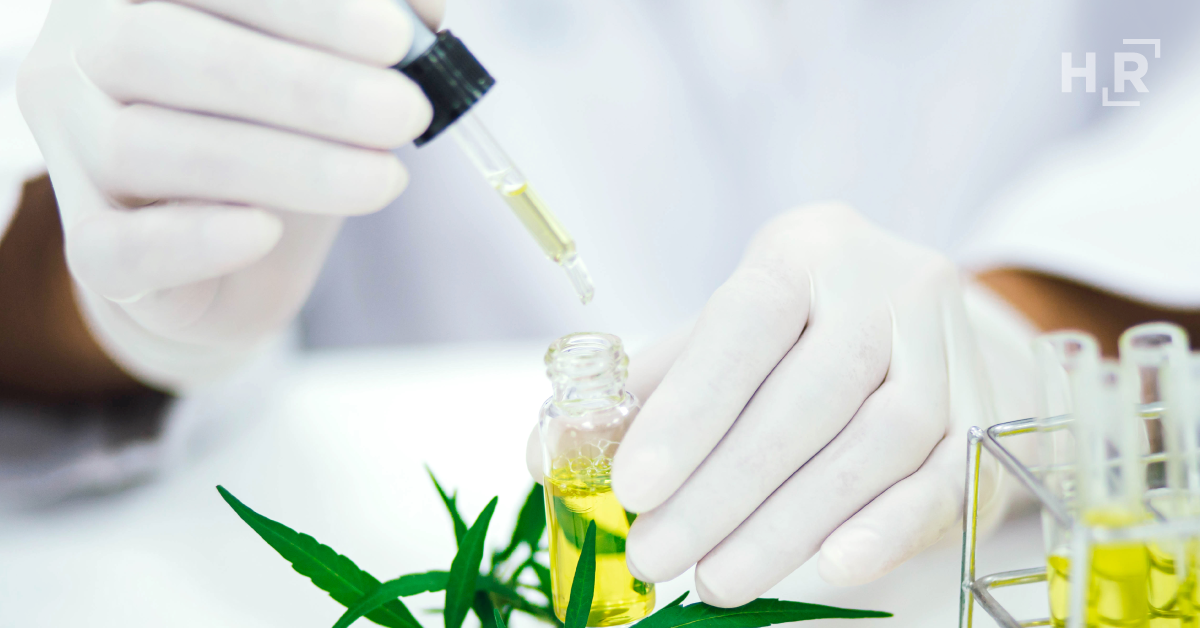Can CBD Impact Drug Testing Results? What Employers Need to Know
As the use of CBD products continues to rise, employers are learning how to navigate drug testing amid varying state marijuana legislation, and growing CBD popularity.

As the use of CBD (cannabidiol) products continues to rise, many employers are grappling with how to navigate drug testing in an era of varying state marijuana legislation and growing CBD popularity. With an increasing number of states legalizing marijuana for both medical and recreational use, and with the growing popularity of hemp-derived CBD products, it can be challenging for employers to keep up with the latest laws, regulations, and guidelines around drug testing.
Understanding the Basics of CBD
CBD and delta-9-tetrahydrocannabinol (THC) are two of the most well-known and researched cannabinoids found in the cannabis plant. CBD is a non-psychoactive compound, meaning on its own it does not produce the "high" commonly associated with marijuana use. Delta-9 THC, on the other hand, is the primary psychoactive compound responsible for the intoxication associated with marijuana use. Despite their differences, employers should understand how both CBD and THC could impact drug test results.
CBD products have gained traction due largely to their use to help manage issues such as pain (both inflammatory and neurogenic) and seizures. CBD can be found in various forms, including oils, vapors, infused edibles (such as chocolate or gummies), and health/beauty products. The U.S. government’s passing of the 2018 Farm Bill (also known as the Agriculture Improvement Act of 2018) boosted the market for these products, as it reclassified industrial hemp from a controlled substance to a regulated agricultural commodity. Hemp is a type of cannabis that contains very low levels of THC (less than 0.3%) and is used to produce CBD products. Therefore, while under federal law, cannabis is considered a Schedule I drug, the Farm Bill legalized the production of hemp within the parameters of the legislation, effectively helping to drive an increase in the production of and demand for hemp-derived CBD.
Even though CBD is found in a variety of over-the-counter (OTC) products, OTC CBD is not considered a regulated or FDA-approved medication. The only form of CBD that is FDA approved and DEA scheduled is Epidiolex. Also, as it currently stands, CBD is not a regulated or FDA-approved dietary supplement. According to an FDA statement released January 2023, “Given the growing cannabidiol (CBD) products market, the U.S. Food and Drug Administration convened a high-level internal working group to explore potential regulatory pathways for CBD products. … [A]fter careful review, the FDA has concluded that a new regulatory pathway for CBD is needed that balances individuals’ desire for access to CBD products with the regulatory oversight needed to manage risks. The agency is prepared to work with Congress on this matter.” Further in that statement, the FDA writes, “The use of CBD raises various safety concerns, especially with long-term use. Studies have shown the potential for harm to the liver, interactions with certain medications, and possible harm to the male reproductive system. CBD exposure is also concerning when it comes to certain vulnerable populations such as children and those who are pregnant.”
Yet not all CBD products are created equal. An OTC CBD product should generally be derived from hemp (which by legal definition has less than 0.3% THC by dry weight). Yet since the CBD manufacturing process is not regulated (see above), the amount of THC in the final product may be considerably higher. If a person uses a CBD product that contains THC and is then subject to a drug test, the presence of THC in the body may result in a positive drug test result. The issue is further complicated by the fact that while CBD is readily available in most states, it is not regulated, leading to concerns from the U.S. Food and Drug Administration (FDA) over the quality, safety, and efficacy of CBD products on the market. Additionally, THC levels may be misrepresented in these unregulated products, leading consumers to believe they’re consuming lower levels of THC than they actually are.
Frequently Asked Questions
As CBD usage becomes increasingly normalized, employers may be faced with new questions and challenges in their drug screening program. Here are a few of the most common questions employers have about CBD, THC, and drug testing.
If an employee takes CBD, will that cause a positive drug test, or do tests have to be specifically looking for CBD?
This is a tricky question, as it depends on the type of drug test and the type of CBD product being used. If an employee is using a CBD product that contains no THC, they should not test positive for marijuana on a standard panel drug test.
However, some CBD products do contain a significant amount of THC, which could potentially show up on a drug test. The amount of THC in CBD products can vary widely, depending on factors such as the strain of cannabis used, the extraction method, and the manufacturing process.
In general, full-spectrum CBD products (which contain other compounds found in the cannabis plant, including THC) are more likely to result in a positive drug test than CBD isolate products (which should contain only CBD).
If someone tests positive for marijuana on a drug test after using an over-the-counter CBD product, would that be considered an inexcusable positive result?
This is another complicated issue. As a non-psychoactive component of the marijuana plant, CBD is commonly used for medicinal purposes despite not officially being a regulated or FDA-approved medication. However, some over-the-counter CBD products contain higher concentrations of THC, which is the psychoactive component of marijuana that causes a person to feel “high.” If a person tests positive for marijuana on a drug test due to the use of an over-the-counter CBD product, it may meet the concentration threshold to be deemed a confirmed positive test by the lab and verified positive by a Medical Review Officer, as the use of a CBD product is not on its own generally considered a verifiable medical explanation that would lead an MRO to overturn a THC positive result. To best wade through potentially murky waters, employers should consult with legal counsel, paying close attention to the DOT’s CBD Notice, before establishing a consistently applied policy that spells out whether or not a positive test result after using an OTC CBD product is grounds for an adverse employment action.
What’s the difference between delta-8 THC and delta-9 THC?
Delta-8 THC and delta-9 THC are both forms of THC, but they have different chemical structures and produce slightly different effects. Delta-9 THC is the most well-known form of THC and is the primary psychoactive component of marijuana. Delta-8 THC, on the other hand, is a less well-known form of THC that is found in much smaller quantities in marijuana. It produces a milder “high” than delta-9 THC and is typically manufactured from hemp rather than marijuana. It’s important for employers to be aware of the difference between these two forms of THC when conducting drug testing.
How long do cannabinoids stay in your system?
Cannabinoids, including THC and CBD, can be detected in the body for varying amounts of time depending on a number of factors, including the frequency and amount of use, the method of consumption, and the individual’s metabolism. THC, the psychoactive component of marijuana, can stay in the system for several days to a few weeks, depending on the frequency of use. CBD, on the other hand, has a shorter half-life and typically clears the system within a few hours to a few days.
The detection window for cannabinoids can also vary depending on the type of drug test specimen used. The most common testing method is urine. The window of detection varies based on whether a person is a sporadic user or a chronic user. When evaluating data from multiple sources and using the standard THC screening level of 50 ng/ml, it is unlikely that a chronic user will be positive for more than 10 days after cessation[SD2] [SD3] (or three to four days for occasional users). Other specimens used in employment drug tests include oral fluid and hair. Oral fluid’s detection window is markedly shorter, while a hair specimen has the longest detection window. However, it’s worth noting that standard drug tests screen for THC (among other drugs included in the panel), therefore CBD that does not contain THC is not typically covered by standard drug tests.
Takeaways for Employers
Employers across the nation may be affected by a growing number of states legalizing marijuana for medical or recreational purposes, some of which have protections for workers or job applicants who test positive for marijuana. At the same time, the use of CBD products is growing and there is still a lack of clarity on how best to handle CBD in an employer’s drug screening program.
Employers should consider updating their drug testing policies and drug-free workplace policies to account for the use of CBD in the workplace and communicate the policies to employees in a timely and effective manner. Employers regulated by the Department of Transportation should also review the DOT’s CBD Notice, which explicitly outlines the DOT’s position on CBD use for safety-sensitive positions, in part stating “The Department of Transportation’s Drug and Alcohol Testing Regulation, Part 40, does not authorize the use of Schedule I drugs, including marijuana, for any reason. CBD use is not a legitimate medical explanation for a laboratory-confirmed marijuana positive result. Therefore, Medical Review Officers will verify a drug test confirmed at the appropriate cutoffs as positive, even if an employee claims they only used a CBD product.” With laws regarding medicinal and recreational marijuana varying across the U.S., employers are encouraged to consult legal counsel to ensure they meet all of their compliance obligations.
To navigate drug tests, employers should ensure they have a justified cause for administering drug tests, administer tests in a consistent manner, and clearly communicate their policies to all employees. It is also important that employers’ policies express the action(s) that will be taken in the event of a positive drug test. When designing or reviewing their drug testing policies, employers should review state and federal laws and regulations and consult legal counsel to ensure compliance. With more research being conducted on the therapeutic benefits of CBD and the FDA exploring regulatory pathways for the substance, it is likely that CBD use will continue to be a topic of discussion for employers in the years to come.
Learn more about our Drug & Health Screening Services on HireRight.com. For more information on building an effective drug testing program, download the Employers' Guide to Building an Effective Drug Testing Program today.
Release Date: April 25, 2023

Dr. Todd Simo
Dr. Todd Simo currently serves as the Chief Medical Officer and Managing Director of Transportation at HireRight. He came to HireRight with a decade of experience in the medical consulting arena. Prior to HireRight, he was the Medical Director of an occupational health clinic in Virginia and owned a consulting firm providing medical director service to multiple companies located throughout the country. In that capacity, he established multiple customer specific health and drug screening services. In his current position, he oversees HireRight's medical department.